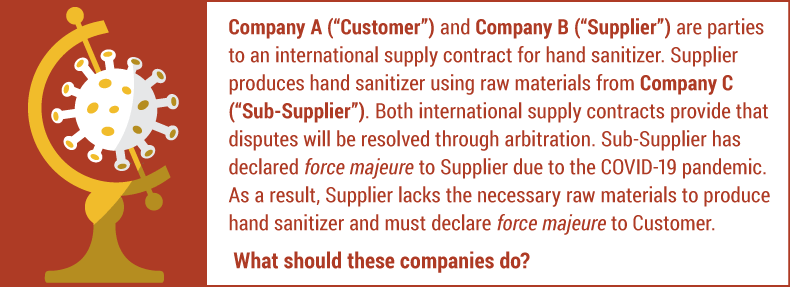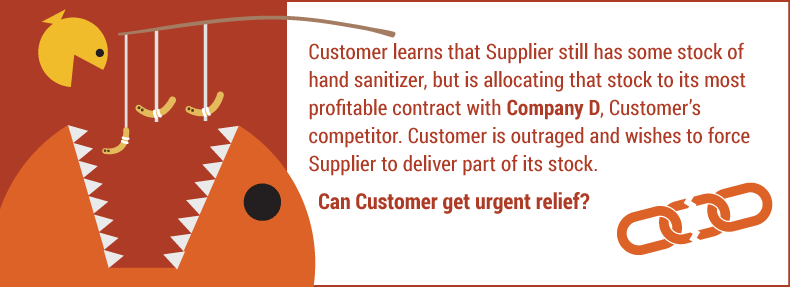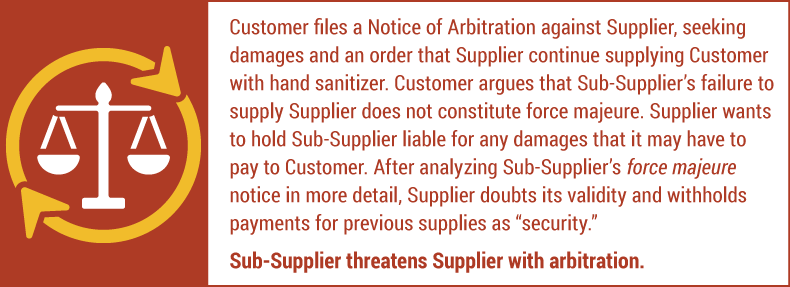How To Obtain Effective Relief When A Global Pandemic Disrupts Your Supply Chain
Executive Summary
The COVID-19 pandemic is disrupting global supply chains and companies need effective tools to manage the related contract disputes. Sidley Austin partner Dorothee Schramm and senior associate Katie von der Weid, both specialized in international commercial disputes, provide tips to help companies manage the situation.
The new coronavirus disease, COVID-19, has led to countless supply chain disruptions. Government-mandated shutdowns, other measures implemented to slow the outbreak’s spread, and an ailing workforce have affected many companies’ production capacities and ability to supply their customers. Many more businesses have received notices from their suppliers stating that they cannot deliver the materials they need to maintain production.
One thing is certain: contract disputes will arise from these supply chain disruptions. Wherever a company is situated in the supply chain, it will need to take steps to protect its legal position, minimize financial exposure and manage the risk that conflicting decisions may arise from parallel disputes across their supply chain. Companies may also need to be able to secure rapid relief, such as the delivery of critical raw materials, to keep afloat.
This article illustrates an example of a common supply chain disruption and provides tips and tools that can help your company when a global pandemic disrupts the supply chain.
All three companies are facing the same question: Who is contractually liable for the supply chain disruption and its financial consequences? The answer is not clear-cut, and depends on the specific COVID-19-related supply problem, the underlying contract and the governing law.
Generally speaking, a company that cannot supply is liable for damages unless it can invoke a force majeure defense based on circumstances outside of its control. Such defense can often – but not always – be found either in the supply contract or in the law that governs the contract.
Contracts often include a force majeure clause that specifically lists certain events that qualify (for example war or pandemics), together with general language to cover other events (for example “matters beyond the party’s control”). Whether a company can invoke such a clause will depend on its language and on the specific COVID-19-related impediment that has made performance impossible. Force majeure clauses typically suspend performance, excuse non-performance, or may even allow the parties to adjust or terminate the contract.
If your contract does not contain a force majeure clause, you must check whether the law governing the contract provides you with a similar defense. Many laws provide a defense if performance is made impossible by an impediment that is beyond the party’s reasonable control, was not reasonably foreseeable when the contract was signed, and cannot be avoided or overcome. Some civil law systems also require prompt notice of a force majeure event.
Faced with a pandemic-related supply chain disruption, the following steps will help the companies in the case study manage the situation and protect their legal position:
-
Identify the root cause. Supplier and Sub-Supplier should identify and document the specific COVID-19-related reasons why supplies are disrupted, such as mandatory shutdowns, employee illness, or something else. The exact nature of the problem matters, and the ability to prove it will be critical in legal proceedings.
-
Conduct a legal analysis. Each company should assess whether the contract or applicable law allows a force majeure defense that covers the specific root cause, and the requirements of this defense. Supplier – as the company in the middle of the chain – needs to assess the risk allocation under each of its contracts separately.
-
Issue and respond to force majeure notices. Supplier and Sub-Supplier should issue force majeure notices that comply with the contractual or legal requirements. Customer and Suppler should not accept notices that are too vague and should ask for more information before taking position (while reserving their rights).
-
Mitigate. Supplier and Sub-Supplier must make all efforts to overcome or mitigate their supply problems, and document those efforts, since a force majeure defense is often excluded if it is possible to overcome the consequences of the problem. For example, it may be necessary to secure replacement goods, even at higher cost.
-
Allocate Carefully. If production is reduced, Supplier and Sub-Suppler must carefully manage the allocation of remaining stock to their different customers. Some contracts and laws require a pro rata allocation, while others allow for a reasonable business judgment. Companies should identify objective criteria (other than profitability) to justify their allocation, and find out how their supplier allocated its stock.
How To Obtain Urgent Protection
Like many international contracts in the life sciences industry, Customer’s contract with Supplier contains an arbitration clause. Under most major international arbitration rules, Customer can choose between seeking interim relief from national courts or an emergency arbitrator. It is worth checking the rules chosen in the contract for whether emergency arbitrator relief is available. For example, under the widely used ICC Rules, emergency arbitrator relief is not available for contracts that pre-date 1 January 2012.
If emergency relief is available, Customer can request an order that Supplier allocate at least part of its remaining stock to Customer. Such relief typically requires a risk of substantial or irreparable harm, a likelihood of success on the merits, urgency, and a balancing of interests. It will be helpful for Customer to show that the non-delivery not only causes financial damage, but also, for example, that Customer is a critical supplier to hospitals with COVID-19 patients. Another key aspect will be the reasons why Supplier allocated all of its stock to Customer’s competitor. If Customer can show that this was driven by profitability, it has a better chance of obtaining urgent relief.
Unlike many national courts, the operations of the major arbitral institutions are not affected by the COVID-19 outbreak. Depending on the institution chosen, Customer can normally expect a decision within 6-17 days from the date of its application. The emergency arbitrator typically decides after one or two exchanges of short written submissions, and a telephone or video hearing. In parallel, or shortly afterwards, Customer must file a request for arbitration.
The emergency arbitrator’s decision typically contains reasons and is binding on the parties, but can later be modified or terminated by the arbitral tribunal. While emergency arbitrator relief cannot typically be enforced abroad, in practice parties often comply with such orders in order not to compromise their position in the arbitration on the merits. Any non-compliance may also qualify as an intentional breach that can overcome contractual limitations of liability.
How To Avoid Parallel Proceedings
The case study illustrates a serious practical problem for Supplier, the company in the middle of the supply chain, who risks getting drawn into two parallel arbitrations. Supplier should aim to avoid parallel arbitrations because of the risk that it must take conflicting positions on force majeure in each arbitration, and that the two tribunals issue conflicting decisions. Moreover, Sub-Supplier holds the key evidence of its COVID-19-related problems that led to force majeure, but the arbitration initiated by Customer may proceed too quickly for Supplier to get access to all of that evidence. Finally, parallel arbitrations are typically more costly for Supplier.
Faced with this dilemma, how can Supplier prevent parallel arbitrations? Most leading arbitration rules allow parties to either combine two arbitrations into one (“consolidation”) or to include a third party into an arbitration (“joinder”). Depending on the rules chosen by the parties, Supplier may have three options: (1) file an arbitration against Sub-Supplier and request consolidation with the arbitration brought by Customer; (2) wait for Sub-Supplier to file an arbitration, file a counterclaim and request consolidation with the arbitration brought by Customer; or (3) request that Sub-Supplier participate in Supplier’s arbitration with Customer.
There are significant differences between the world’s major arbitration rules regarding the possibility and requirements of consolidation and joinder. To name some prominent examples, the Swiss Rules of International Arbitration (Swiss Rules) are more liberal than the Rules of the International Chamber of Commerce (ICC) or the London Court of International Arbitration (LCIA). While the devil lies in the detail, here are some things for a supplier to consider when faced with the prospect of parallel proceedings across its supply chain:
-
Check whether the arbitration clauses in each supply contract are compatible in terms of arbitration rules, the seat of arbitration, language, and other procedural features. The more the clauses are compatible, the better the chances for consolidation and joinder.
-
Check whether the chosen arbitration rules require the consent of all parties. Some rules do not, but many rules require such consent in cases involving different contracts between different parties. Supplier may not get Sub-Supplier’s and Customer’s consent, as consolidation and joinder affect their ability to nominate an arbitrator of their choice, and they may not wish to share confidential information with third parties.
-
Generally, consolidation and joinder will be significantly more difficult once the tribunal in the first arbitration is constituted.Supplier therefore needs to act quickly.
-
Supplier must generally show close factual, legal or logical links between the two cases (which should be possible in this case scenario) and overcome concerns about delays and legitimate confidentiality interests (which certain procedural tools can address).
If the arbitration agreements are compatible and provide for a liberal set of rules, such as the Swiss Rules, Supplier may have a decent chance for consolidation or joinder if it acts quickly.
Final Tips For Managing Supply Chain Disputes
Disputes across a global supply chain can be complex to manage and costly to resolve. Here are some final tips for managing such disputes:
-
Managing disputes proactively and promptly saves you time and money. You should try to find an amicable solution with your upstream and downstream partners about the problems and damages caused by COVID-19, which is faster and cheaper than litigating, and best preserves the business relationship. (Also see "Contract Disputes Trends In Medtech" - In Vivo, 6 May, 2019.)
-
In drafting new contracts, think strategically about your dispute resolution clause. Choose a reputable place of arbitration and a major arbitration institution that provides for emergency arbitrator relief and, particularly if you are in the middle of a supply chain, a liberal approach to consolidation and joinder. To the extent possible, make sure that the arbitration clauses in your upstream and downstream contracts are compatible (in terms of arbitral institution, seat, governing law, language, and other procedural features). (Also see "Conflict Management Strategies And Dispute Resolution Clauses – Ensuring Your International Contract Will Be Enforced" - In Vivo, 4 Feb, 2019.)
This article has been prepared for informational purposes only and does not constitute legal advice. This information is not intended to create, and the receipt of it does not constitute, a lawyer-client relationship. Readers should not act upon this without seeking advice from professional advisers. The content of the article is personal to the authors and does not reflect the views of the firm or its clients.


